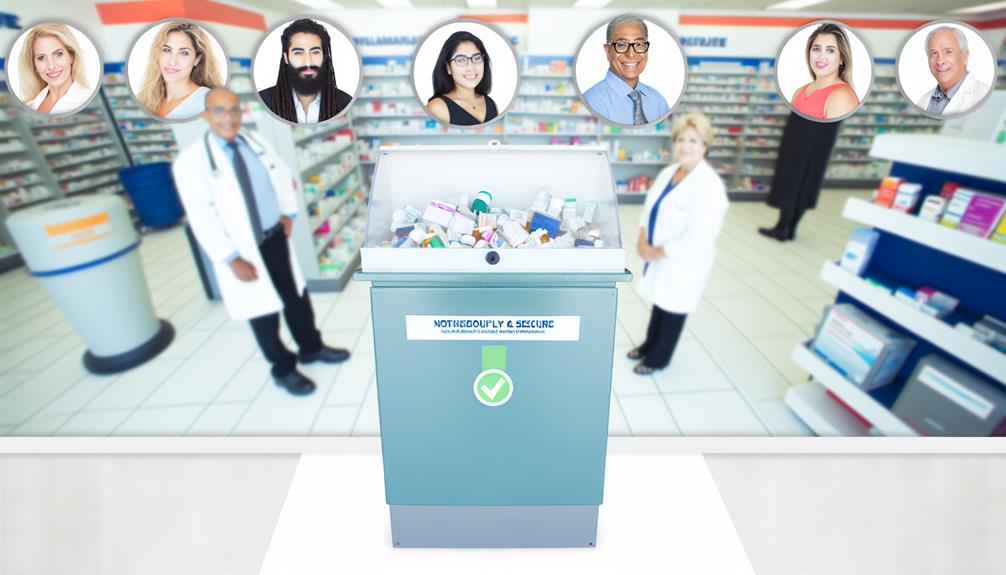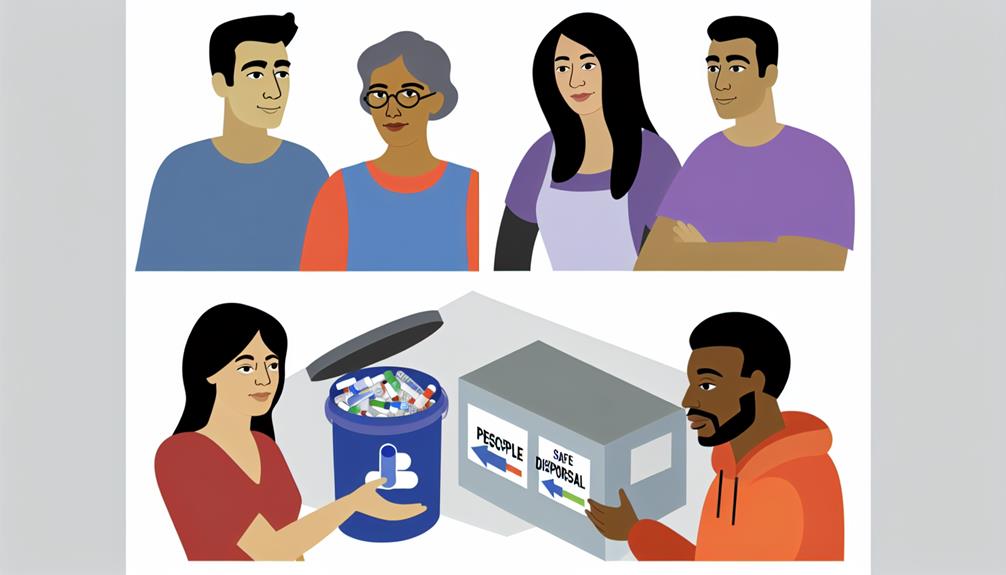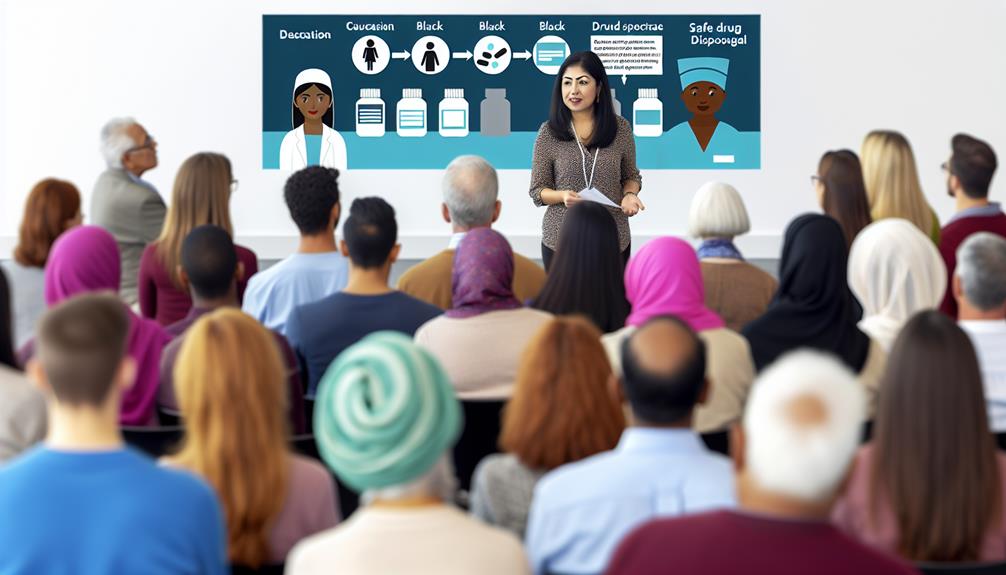You've probably heard the old saying, 'An ounce of prevention is worth a pound of cure.' This adage holds true when it comes to the issue of prescription drug abuse. Safe disposal of medications plays a crucial role in saving lives and putting an end to this growing epidemic.
But why is it so important? What are the risks of improper drug disposal? And what can communities do to contribute to overdose prevention? In this discussion, we will explore the methods for safe disposal of prescription medications and the significance of promoting awareness and education in this matter.
So, let's dive in and uncover the crucial steps we can take to ensure the safe disposal of prescription drugs and ultimately save lives.
Importance of Safe Medication Disposal

Safe medication disposal is crucial in preventing prescription drug abuse and ensuring the safety of individuals and the community. Proper disposal of medications not only helps to prevent misuse and abuse but also has significant environmental benefits.
When medications are disposed of properly, they're less likely to end up in the wrong hands, reducing the risk of accidental ingestion or intentional misuse. By safely disposing of medications, you're taking an active role in safeguarding your own health and the well-being of others.
One of the key benefits of proper medication disposal is the prevention of prescription drug abuse. Unused or expired medications that are left in medicine cabinets can be easily accessed by others, including children or individuals seeking to abuse prescription drugs. By safely disposing of these medications, you're removing the temptation and reducing the availability of these drugs.
Improper medication disposal can also have a detrimental impact on the environment. When medications are flushed down the toilet or thrown in the trash, they can end up in waterways or landfills, potentially contaminating the environment and posing a risk to wildlife and human health.
Proper disposal methods, such as participating in drug take-back programs or using designated medication disposal containers, help to ensure that medications are disposed of in a way that minimizes their environmental impact.
Risks of Improper Drug Disposal
Improperly disposing of medications can pose significant risks, both to individuals and the environment. When medications aren't disposed of properly, they can end up in the wrong hands, leading to misuse and abuse. This has serious consequences for public health and safety.
In addition, improper drug disposal can have a negative environmental impact. Medications that are flushed down the toilet or thrown in the trash can contaminate water sources and harm aquatic life.
One of the main risks of improper drug disposal is the potential for accidental ingestion. Children or pets may come across discarded medications and mistake them for candy or treats. This can result in poisoning or other adverse effects. Furthermore, medication residues can leach into the soil and water, affecting plants, animals, and ecosystems.
Apart from the health and environmental risks, improper drug disposal can also have legal consequences. In many places, it's illegal to dispose of medications in ways that aren't approved or recommended. There may be specific regulations governing the appropriate methods of disposal. Violating these laws can result in fines or other penalties.
To mitigate these risks, it's essential to educate the public about proper medication disposal methods. Providing clear guidelines on how to safely dispose of unused or expired medications can help prevent misuse, protect the environment, and avoid legal issues.
Role of Communities in Overdose Prevention

Communities play a crucial role in preventing overdoses and promoting safety. Community engagement is vital in addressing the issue of drug abuse and overdose prevention. By coming together, communities can implement harm reduction approaches that save lives and protect individuals from the devastating consequences of drug misuse.
Here are some key ways in which communities can contribute to overdose prevention:
- Education and Awareness: Communities can organize workshops, seminars, and awareness campaigns to educate people about the dangers of drug abuse and the importance of safe drug disposal. By increasing knowledge and understanding, community members can make informed choices and take necessary precautions.
- Distribution of Naloxone: Naloxone is a life-saving medication that can reverse opioid overdoses. Communities can play a role in ensuring the widespread availability of naloxone by organizing training programs and distributing naloxone kits to individuals at risk of overdose or their loved ones.
- Support and Counseling Services: Communities can establish support groups and counseling services to provide assistance and guidance to individuals struggling with addiction. These services can offer a safe space for individuals to seek help, share experiences, and access resources for treatment and recovery.
- Collaboration with Law Enforcement: Communities can work hand in hand with law enforcement agencies to combat drug abuse and overdose. By establishing partnerships, communities can enhance surveillance efforts, identify potential risks, and take proactive measures to prevent overdose incidents.
Methods for Safe Disposal of Prescription Medications
To ensure the proper disposal of prescription medications, it's important to follow safe and environmentally-friendly methods. Improper disposal of medications can have severe environmental impacts, including contamination of waterways and soil. Additionally, it can contribute to the misuse and abuse of prescription drugs.
To address these concerns, government regulations have been put in place to guide the safe disposal of prescription medications.
One common method for safe disposal is to take unused or expired medications to a drug take-back program. These programs are often organized by local law enforcement agencies, pharmacies, or community organizations. By participating in these programs, you can ensure that your medications are disposed of properly and don't end up in the wrong hands.
If a drug take-back program isn't available in your area, there are alternative methods you can follow. The Food and Drug Administration (FDA) suggests mixing medications with an undesirable substance, such as coffee grounds or cat litter, and placing them in a sealed bag before throwing them in the trash. It's important to remove any personal information from the prescription bottle before disposing of it.
Promoting Awareness and Education for Safe Disposal

Promoting awareness and education about the safe disposal of prescription medications is crucial for preventing misuse and environmental harm. By implementing effective campaign strategies and encouraging community involvement, we can make a significant impact in ensuring the safe disposal of prescription drugs.
Here are some key ways to promote awareness and education:
- Develop educational materials: Create brochures, posters, and online resources that provide information about the importance of safe disposal and how to properly dispose of prescription medications. These materials should be easily accessible to the general public, healthcare providers, and pharmacies.
- Conduct community outreach programs: Organize community events, workshops, and seminars to educate individuals about the risks of prescription drug misuse and the proper methods of disposal. Engage local organizations, schools, and healthcare providers to collaborate and spread awareness.
- Utilize social media and online platforms: Leverage the power of social media and online platforms to disseminate information about safe disposal. Share informative videos, articles, and infographics that highlight the importance of proper disposal practices.
- Collaborate with pharmacies and healthcare providers: Partner with pharmacies and healthcare providers to promote safe disposal practices. Encourage them to provide information about safe disposal methods and offer convenient disposal options for unused medications.








